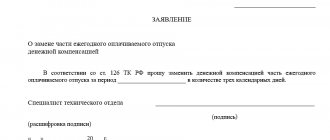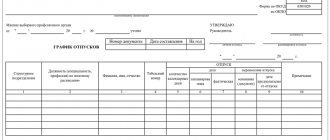Is an employee entitled to additional annual rest: how to determine this?
The rules of the Labor Code of the Russian Federation directly guarantee additional paid leave for:
- specialists in harmful or dangerous industries;
- employees of organizations with a special nature of work;
- specialists with irregular schedules;
- workers in the Far North and in regions equivalent to it;
- athletes (Article 116 of the Labor Code of the Russian Federation, Article 348.10 of the Labor Code of the Russian Federation).
Additional rest can also be provided for sanatorium treatment in the event of an insured event (for example, an industrial accident). ConsultantPlus experts explained how to provide additional leave in this case. Get trial access to the K+ system and move on to the Ready-made solution for free.
Other legal grounds for assigning additional paid leave to a person can be recorded:
1. In the provisions of other federal sources of law.
For example, enshrined in clause 5.1 of Art. 11 of the Law “On the Status of Military Personnel” dated May 27, 1998 No. 76-FZ, according to which military personnel with the status of combat veterans can take paid rest, which is added to the main one, lasting 15 days.
2. In the local regulations of the employer.
Here, additional rest can be established for any categories of specialists.
Annual additional leave must be separated from extended rest (longer than the usual 28 days according to Article 115 of the Labor Code of the Russian Federation), which is assigned, for example:
- teachers (in the manner prescribed by Article 334 of the Labor Code of the Russian Federation);
- employees of law enforcement agencies, civil servants (in accordance with individual federal sources of law).
An employee receiving extended leave can fully take advantage of the additional rest period, if there are grounds for this.
The duration of annual additional paid leave depends on its specific type. Let us study, as an example, what duration vacations can have for the categories of workers specified in the industry-wide standards of Art. 116 Labor Code of the Russian Federation.
How to apply
It can be provided either in conjunction with the main rest period or separately from it.
To receive the coveted days, you must contact your employer in writing. The form of appeal may be free, but may be established by the accounting policy of the organization. In the first case, you can use a suitable sample from those we offer below. In the second - in the established form, it is provided by the HR department.
After this, you will need to issue an order indicating the period of work for which the employee is granted additional vacation days. It is mandatory for the employee to be familiar with this order.
In addition, it is required to enter the data from the order into the T-2 card.
Calculation of additional days for vacation in harmful or hazardous production: nuances
The duration of the type of vacation under consideration is at least 7 days (Article 117 of the Labor Code of the Russian Federation). Longer rest for specialists in harmful or dangerous production can be established by a contract with the employer, taking into account:
- norms of collective agreement;
- norms of industry or inter-industry agreement;
- results of a special assessment of working conditions.
You can familiarize yourself with the features of conducting a special assessment of working conditions at an enterprise in this article.
An additional period of rest for the category of workers in question is provided based on the fact that during the 12 months (for which the corresponding leave is given) the person worked in harmful or dangerous work. If he worked some part of the time under normal conditions, then this time is not taken into account when calculating the duration of the additional rest period (Article 121 of the Labor Code of the Russian Federation).
ATTENTION! If, based on the results of a special assessment, working conditions are found to be safe, additional rest is not provided (Part 4 of Article 219 of the Labor Code of the Russian Federation).
An important nuance: if there are several legal grounds for assigning additional paid leave for harmful working conditions, the corresponding rest is given only on 1 basis (clause 18 of the Instruction, approved by the appendix to the resolution of the State Committee for Labor of the USSR and the All-Russian Central Council of Trade Unions dated November 21, 1975 No. 273/P-20).
If you have access to ConsultantPlus, check whether you have correctly determined the duration of additional leave for an employee employed in hazardous work.
If you don't have access, get a free trial of online legal access.
Compensation
Payment for bonus days off is made in the same manner as for regular vacations, that is, based on the average level of the worker’s salary. Part of the annual paid leave exceeding 28 calendar days is compensated by money based on the application, but not always. Mandatoryly, according to (Article 126 of the Labor Code of the Russian Federation), pregnant women are provided with additional leave and the following categories of citizens:
- minors;
- persons exposed to radiation during the liquidation of the Chernobyl disaster;
- workers working in harmful, dangerous working conditions.
But if the period of additional leave for harmful working conditions of an employee exceeds the minimum established (7 calendar days), then the part exceeding these 7 calendar days is replaced with special monetary compensation. This is done on an industry basis. intersectoral agreements, collective agreements and written consent of the worker. If upon dismissal an employee has days off, compensation is paid upon final payment.
What is the duration of rest for the special nature of the work?
This type of leave is provided for in Art. 118 of the Labor Code of the Russian Federation and establishes, in particular:
- for employees sent to the Chechen Republic - lasting 2 days for each full month of work (clause 5 of the Decree of the Government of the Russian Federation of December 31, 1994 No. 1440);
- for medical specialists in general practice - lasting 3 days for continuous work in positions held for more than 3 years (clause 1 of the Decree of the Government of the Russian Federation of December 30, 1998 No. 588).
Government regulations may establish other legal grounds for sending workers on vacation for special working conditions.
In the provisions of a number of regulations, one can find grounds for assigning additional paid leave for working in special conditions in combination with other vacation privileges.
For example, according to the provisions of sub. 1 clause 1 and clause 4 art. 58 of the Law “On Service in Internal Affairs Bodies” dated November 30, 2011 No. 342-FZ, law enforcement officers have the right to an additional rest period of up to 10 days for service in special conditions. This is not counting the fact that security forces also have extended regular leave - 30 days in a region with a normal climate, 45 days in the Far North (Clause 1, Article 57 of Law 342-FZ).
Vacation at your own expense
What a vacation . When an employee cannot go to work for family reasons or other valid reasons. For example, caring for a dying relative. The list of circumstances is unlimited. Basis - art. 128 Labor Code of the Russian Federation.
Salaries are not paid for this time, and vacation pay before leaving is not given.
It is impossible to force an employee to go on leave without pay.
Duration . The employer is obliged to grant leave without pay to:
- WWII participants - for 35 calendar days a year;
— old-age pensioners — for 14 calendar days a year;
- parents and spouses of deceased military personnel, police officers, firefighters, and correctional service employees - for 14 calendar days a year;
— disabled people — for 60 calendar days a year;
- at the birth of a child, wedding or death of loved ones - for 5 calendar days, possibly several times a year.
In all other cases, the duration of the vacation is agreed upon at one’s own expense. There is no lower or upper limit; you can apply for either three days or a year.
Documents for registration .
Employee application, order, entry in a personal card. Plus - documents that confirm that the employee cannot work. For example, a death certificate for a relative. If the deadline has passed and the employee still cannot leave, he writes a statement again, and the employer again issues an order.
What is the rest period for employees with irregular working hours?
The type of additional paid leave in question is assigned to specialists with an irregular work schedule, and the duration of such rest should not be less than 3 days (Article 119 of the Labor Code of the Russian Federation, clause 3 of the Rules for the provision of additional leave, approved by Decree of the Government of the Russian Federation of December 11, 2002 No. 884).
The list of positions in which work is carried out according to an irregular schedule is established by the employing company in local regulations (Article 101 of the Labor Code of the Russian Federation). The contracts of employees holding such positions also indicate information about the corresponding schedule (Article 57 of the Labor Code of the Russian Federation).
In this case, it does not matter what hours the employees in “irregular” positions actually worked: even if their work hours completely coincided with those established for workers with a standard 8-hour schedule, nevertheless, their schedule is considered irregular and gives the right to the type of rest in question (letter of Rostrud dated May 24, 2012 No. PG/3841-6-1).
Vacations for certain categories of employees
Depending on working conditions and the chosen profession, some officially employed citizens may qualify for more days of rest. The employer is obliged to take into account additional days of rest when drawing up a vacation schedule; additional applications from the employee are not necessary.
Medical workers
Some employees of medical institutions have the opportunity to rest for more than 28 calendar days. For example, health workers caring for patients whose diseases are incurable. Or doctors caring for patients with HIV and/or AIDS, since they are at risk of getting sick themselves. In this case, the state gives two weeks of additional rest.
Employees of Russian missions abroad
There are categories of workers who carry out their activities outside the borders of Russia. At the same time, the official employer is the enterprises of our country. Depending on the climatic conditions where a person has to live and work, he has the opportunity to rest longer, despite the restrictions on the minimum duration of the next rest.
How long is the additional holiday in the Far North?
In general, workers in the Far North are assigned 24 days of additional paid leave, and workers in those parts of the country that are equivalent to it are assigned 16 days (Article 321 of the Labor Code of the Russian Federation). If the region in which a person works is not northern, but the law defines a regional coefficient and bonus for it, then the duration of the additional leave will be 8 days (Article 14 of the Law of the Russian Federation “On State Guarantees for Persons in the Far North” dated February 19, 1993 No. 4520-1 ).
Moreover, if the law establishes other privileges for certain categories of workers in the Far North in terms of determining the duration of rest, then they can supplement those reflected in Art. 321 Labor Code of the Russian Federation.
Thus, we noted above that law enforcement officers in the Far North, in accordance with paragraph 1 of Art. 57 of Law 342-FZ receive basic (extended) rest of 45 days. A worker entitled to this privilege by virtue of his status will also be able to take advantage of a separate additional rest period of 24 days on the basis of Art. 321 Labor Code of the Russian Federation.
Study leave
What a vacation . For pupils, undergraduates and graduate students of educational institutions with state accreditation. If an employee is studying at a private institution without accreditation or just taking courses, he is not entitled to study leave. Basis - art. 173, 173.1, 174-177 Labor Code of the Russian Federation.
They are allowed to study only when the employee receives education at this level for the first time. When receiving a second higher education, leave may not be given.
Duration . Depends on the level of education and form of training.
Part-time and part-time university students are given leave with pay:
- at the session in the 1st and 2nd courses - 40 calendar days, in subsequent courses - 50 calendar days;
— for state exams and thesis defense — up to four months.
University applicants are given leave without pay:
— for entrance exams — 15 calendar days;
— for preparatory courses — 15 calendar days.
Full-time university students are given leave without pay:
— at the session — 15 calendar days for the whole year;
— for state exams and thesis defense — up to four months.
Postgraduate students and part-time residents are given additional leave with pay for 30 calendar days per year.
Students of colleges and schools on part-time and part-time basis are given leave with pay:
- at the session in the 1st and 2nd courses - 30 calendar days, in subsequent courses - 40 calendar days;
- for state studies and thesis defense - up to two months.
Applicants to colleges and schools are given leave without pay:
— for entrance exams — 10 calendar days;
Full-time students of colleges and schools are given leave without pay:
— at the session — 10 calendar days for the whole year;
- for state studies and thesis defense - up to two months.
Schoolchildren are given leave with pay:
- for exams after 9th grade - 9 calendar days;
- for exams after 11th grade - 22 calendar days.
Documents for registration . A summons certificate from an educational institution - it will contain the deadline for the session and exams, an employee statement, an order, and an entry in a personal card.
When are primary and additional holidays granted under the Labor Code of the Russian Federation?
Basic and additional paid leave can:
1. Provided separately.
2. Provided simultaneously (by combining all days of both types of vacation).
2. To be summed up and provided in parts (Article 125 of the Labor Code of the Russian Federation):
- in accordance with the agreement between the parties to the employment contract;
- provided that the duration of at least 1 period of continuous rest for the employee will not be less than 14 days.
Both leaves are generally granted after 6 months of employee’s work in the company (Article 122 of the Labor Code of the Russian Federation). In relation to both types of vacation, the rule applies according to which weekends are included in vacation, and non-working holidays are excluded when calculating its duration (Article 120 of the Labor Code of the Russian Federation).
Thus, from the point of view of the provisions of the Labor Code of the Russian Federation, the main and additional rest periods have much in common. But from the point of view of tax legislation, the difference between them can be quite significant in a number of legal relations. Let's study this nuance in more detail.
Calculation of vacation payments
Additional vacation days granted to an employee for length of service must be paid by the employer. The scheme for calculating vacation funds is standard: the employee’s average daily earnings are multiplied by the total number of vacation days. In this case, additional payments may be taken into account in the calculation, for example:
- Allowances for continuous work experience.
- Bonuses or incentives, if the employee has fulfilled all the conditions for receiving it , in accordance with local regulatory documents.
- Material aid.
- Allowances for special working conditions, for example, in the Far North region and for working with documents marked as state secrets.
At the same time, Article 46 of Russian Law No. 79 states that civil servants must pay vacation funds no less than 10 days before the start date of the vacation.
Payment for additional rest from the point of view of tax legislation: nuances
In the process of maintaining tax records, an employer providing additional rest periods to employees should keep in mind that:
1. Vacation pay paid for additional rest during harmful and dangerous work can be included in the company’s expenses (clause 24 of Article 270 of the Tax Code of the Russian Federation) if:
- the rest period does not exceed what is required by law - in full;
- the provision of additional rest is regulated by an employment contract, local regulation or other source of norms other than the collective agreement, also in full.
And if voluntary additional paid leave is assigned specifically under a collective agreement, then the inclusion of vacation pay in this case in expenses is not allowed (letter of the Ministry of Finance of Russia dated May 31, 2016 No. 03-03-06/3/31323, resolution of the Ninth Arbitration Court of Appeal dated June 5, 2009 No. 09AP-8089/2009-AK).
Firms should also expect that Federal Tax Service inspectors will primarily focus on Art. 270 Tax Code of the Russian Federation. The fact is that tax reporting, in general, does not include internal personnel regulations, and inspectors, by default, can consider collective agreements as a source of rules establishing additional vacations in a company.
2. In some cases, vacation pay for additional paid leave may be exempt from personal income tax and social contributions, for example, paid to participants in the liquidation of the Chernobyl accident. According to the Ministry of Finance, they are not related to the performance of labor functions and should be equated with compensation payments, which, according to clause 3 of Art. 217 of the Tax Code of the Russian Federation are not taxed (letter of the Ministry of Finance of the Russian Federation dated 06/01/2007 No. 03-04-06-02/8). In other situations, additional leave is subject to personal income tax and insurance contributions in the general manner.
Concept
This type of leave is a certain period of continuous rest for an employee from work obligations, which is provided by the company’s management on the basis of current legislation or an employment contract as compensation or incentive for working conditions. At the same time, the worker retains his job and average salary.
Such rest is paid for from the employer’s funds, and the duration does not overlap with the period of the main rest.
In some situations, a worker can voluntarily receive monetary compensation instead of rest, however, this rule has some limitations. In particular, it is prohibited to replace additional leave with compensation for pregnant women, minor workers, and employees of hazardous work. In addition, the employee is prohibited from receiving compensation if he has not rested for 2 weeks without a break.
Having rested for the required 14 days, the employee can agree on the remaining vacation period with the employer and take it in installments at a time convenient for him or receive compensation.
Results
Additional paid leave can be assigned to an employee on various grounds: prescribed in the Labor Code of the Russian Federation, enshrined in other federal regulations, reflected in local regulations. Its duration depends on the specific basis. It also determines the specifics of tax accounting when paying a worker for an additional period of rest.
You can find out more about the specifics of additional vacations in the articles:
- “Additional leave for irregular working hours”;
- “Are working pensioners entitled to additional leave?”.
Calculate your vacation pay correctly. Our online calculator will help you with this.
Sources: Labor Code of the Russian Federation
You can find more complete information on the topic in ConsultantPlus. Free trial access to the system for 2 days.






